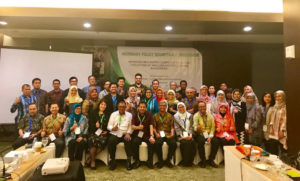Dairy consumption in Indonesia is on the rise. Increasing per capita income, urbanisation, emerging middle class and westernisation of diets has led to a significant increase in the demand for milk and milk products. However, the production of dairy in Indonesia is regionally consolidated. Highest concentration of dairy farmers in Indonesia is on the island of Java. The Government of Indonesia (GoI) is investing substantial resources into the nation’s dairy sector, aiming to increase domestic production. There are significant challenges in the Indonesian dairy supply chain like highly variable quantity and quality of feed resources, low animal reproductive performance, poor mastitis management, dairy farming dominated by smallholder farmers (approx. 2-3 cows) and lack of understanding across the value chain of market dynamics, including price signals.

The high priority the Indonesian government has placed on dairy industry development aligns closely with Australian Centre for International Agricultural Research (ACIAR) research priorities related to strengthening livestock management and marketing systems in Indonesia as well as improving smallholder access and competitiveness in rapidly transforming markets. The IndoDairy project funded by ACIAR and led by Prof. Wendy Umberger of Centre for Global Food and Resources (GFAR) aims to increase milk supply (quantity and quality) by 25% by 2020 of at least 3000 dairy producers in West Java and Northern Sumatra.

The project team during one of the field activities
The key activities of this project include implementation of a dairy farm household survey, value chain analysis of dairy value chains in West Java and North Sumatra, review of existing policies for the dairy sector in Indonesia and guidelines and opportunities of heifer importation from Australia to Indonesia.
The results from the key activities of the project were shared with key policy makers from the Indonesian Government at the IndoDairy Policy Roundtable Discussion held recently. Key Indonesian government officials attended the policy roundtable from the Ministry of Coordinating Economic Affairs, Ministry of Agriculture, Ministry of Industry, Ministry of Trade, Ministry of Livestock and Animal Health, Ministry of Cooperatives and small to medium enterprises and key members of the IndoDairy project team.

Participants of the Indodairy Policy Roundtable Discussion
During the roundtable there was a lot of useful discussion representing different areas of government and policy making. GFAR researcher Jack Hetherington summarises some take home messages from the participants of the policy roundtable discussion:
- Developing policies that will support the development of innovative business models is essential. Business models need to be inclusive of smallholder farmers, sustainable and commercially viable.
- Dairy cooperatives play a key role in the Indonesian dairy sector due to the small production scales of farmers in West Java. Additionally, they play an important the role as a catalyst of community development.
- Increasing the number of dairy cows per farm is one way to increase the domestic production and decreasing the reliance on imported milk products (e.g. powdered milk). This can be achieved by increasing importation of dairy cattle.
- There is an opportunity to increase the milk price received by farmers through introduction and monitoring of standards around milk quality. Currently, there are no standards around how milk products are labelled, so ‘fresh’ milk may contain a proportion of powdered products. By introducing policies on labelling of that recognise ‘fresh’ milk as a being 100% from liquid milk (ie not reconstituted milk) will give a more competitive edge to smallholders in Indonesia.
- Other key priorities for policy development is improving animal welfare standards through provision of good quality feeds and better farm management practices.
- Research and development needs to focus on encouraging use of by-products of the food industry as a source of feed for dairy cattle. Feeds, such as tofu waste, can be a cheaper alternative to concentrates and are high in important nutrients (e.g. protein). These can be used to balance dairy cattle diets, especially when concentrate costs are high or the availability is low.
At the Policy Roundtable, the IndoDairy Smallholder Household Survey (ISHS) Factsheets were launched. The set of factsheets provide a complete overview of the information gained from the analysis of data collected from the Indonesian Smallholder Household Survey (ISHS).
The factsheets provide insight into the dairy farm characteristics of smallholder dairy farms of West Java and give detailed information on farmer attitudes, perceptions of change, dairy farm inputs, milk productivity, milk prices, milk quality aspects, dairy farming costs, revenue and profitability. This new knowledge about the dairy sector in Indonesia has been used to develop an extension and technology dissemination study with five dairy co-operatives in West Java.
For more information on the project, visit our website https://www.adelaide.edu.au/global-food/research/international-development/indonesia-dairy/ or https://www.indodairy.net/.

